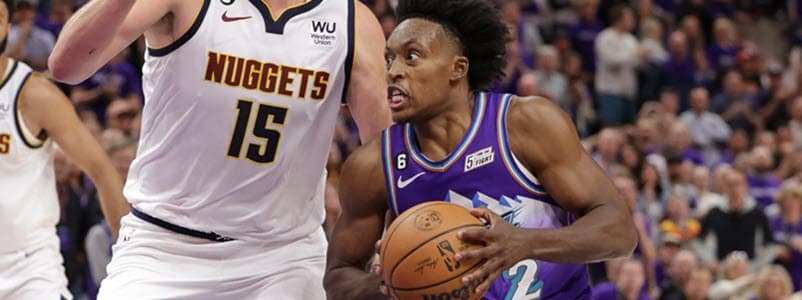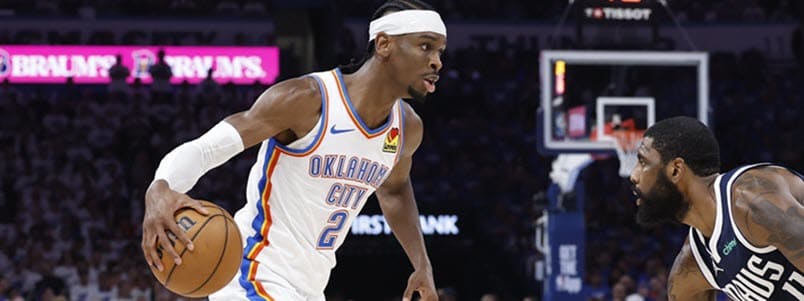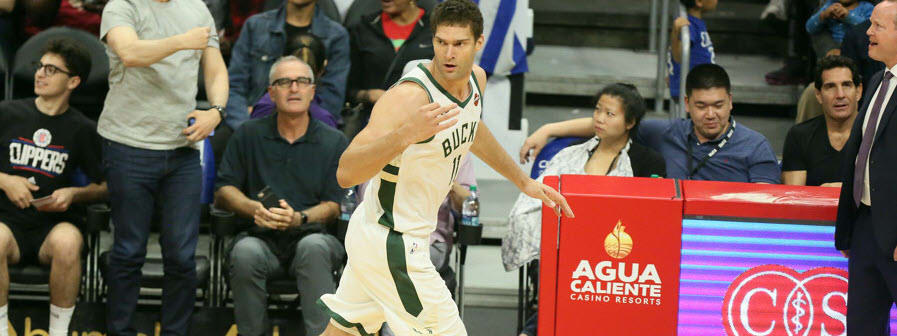Recent RotoWire Articles Featuring D'Angelo Russell
See More
Russell quietly improved his shooting efficiency last season, posting career-best marks by knocking down 46.9 percent of his attempts from the field, 39.6 percent from deep and 82.9 percent from the charity stripe. His other numbers were in line with his previous two campaigns, as the veteran point guard averaged a steady 17.8 points, 6.2 assists, 3.0 rebounds, 2.7 three-pointers and 1.0 steals over 71 contests. The bulk of that work came with Minnesota, but Russell didn't experience any falloff after a trade deadline deal that resulted in a reunion with the Lakers, with whom his NBA career started. Though it may seem like he's been in the league a long time, the 2015 second-overall draft pick is still only 27 years old, so he remains in his basketball prime. Recent history reveals that Russell's season-long per-game numbers are fairly predictable. Thus, the big question in fantasy is whether he'll be able to sustain the improved shooting percentage from last season. Prior to 2022-23, he had never shot better than 43.4 percent from the field. Despite struggling at times during Los Angeles' playoff run, Russell was brought back by the Lakers on a two-year deal, and he'll have the opportunity to run the offense for a team with legitimate title aspirations. He isn't likely to suddenly ascend into elite point-guard territory, but Russell should continue to be a steady source of points, triples and dimes while helping to lessen the offensive load on the shoulders of LeBron James and Anthony Davis.
Last season marked Russell's second full campaign with the Timberwolves, and he improved compared to his first season with the team. Notably, his assists per game increased from 5.8 APG to 7.1 APG, and he also upped his free-throw percentage from 76.5% to 82.5%. His other stats came out to 18.1 points, 3.3 rebounds, 2.7 threes and 1.0 steals. The result was a per-game fantasy rank of 59 in eight-category roto leagues -- an improvement of 21 spots compared to 2020-21. Heading into 2022-23, Russell is expected to remain Minnesota's starting point guard, and he'll have a new lob target in Rudy Gobert, which should continue giving Russell a high floor as an assist man. However, Russell's scoring role may decrease given the presence of Gobert, plus continuing improvement from Karl-Anthony Towns and, especially, Anthony Edwards. Fantasy managers needing a starting-caliber point guard should feel confident taking Russell in the mid-rounds of most fantasy drafts. He'll continue being a 30-minute player with the primary distributing role in a fast-paced offense.
Russell's first full season in Minnesota did not go as planned, as injuries limited the guard to just 42 total appearances and 28.5 minutes per game -- his fewest since his rookie year with the Lakers in 2015-16. Bad luck seems to strike the Timberwolves on an annual basis, but heading into 2021-22, the pieces are in place for Russell and company to finally take a step forward. With Ricky Rubio out of the way, Russell should return to handling a larger workload, though he'll have to contend with a trio of high-usage players in Karl-Anthony Towns, Anthony Edwards and Malik Beasley for touches. The Wolves also added veteran Patrick Beverley via trade in August. Still, Russell should have a good chance to bounce back and return to being a 20-point-per-game scorer who adds assists and high-volume threes. Russell has averaged at least 2.9 made threes per game in each of the last three seasons, and he's notched at least one steal per game in five of his six NBA campaigns. The potential for missed time must be factored into Russell's evaluation, however, as he's played fewer than 50 games in three of the last four seasons.
Russell spent his first 33 appearances of last season with the Warriors after signing a four-year, $117.3 million contract as part of a sign and trade with the Nets that sent Kevin Durant to Brooklyn. Later, on Feb. 6, Russell was traded to the Timberwolves for Andrew Wiggins and picks. Russell's numbers were practically the same for both squads, and on the season as a whole, the guard averaged 23.1 points, 6.3 assists, 3.9 rebounds and 1.1 steals. Overall, it was extremely similar to his 2018-19 campaign with the Nets, and his fantasy value (third-round) was just one spot lower in 2019-20 on a per-game basis. With the Timberwolves, he didn't have a real opportunity to share the court with Karl-Anthony Towns, as the latter was injured late in the season. So, in 2020-21, we'll see how Russell will do while paired with one of the best offensive centers in the league. The Wolves adding Ricky Rubio and No. 1 pick Anthony Edwards could cut into Russell's usage slightly, but it shouldn't be enough to result in a drastic dip in fantasy value.
Russell's second and final season with the Nets was by far the best of his career, as he became the undisputed leader of a playoff team on his way to his first All-Star selection. The point guard took a massive leap in 2018-19, posting career-highs in points (21.1 per game), assists (7.0 per game) and three-point shooting (36.9 percent) while starting in 81 regular-season games for Brooklyn. Despite that, one of the highlights of the Nets' monster offseason was signing All-Star point guard Kyrie Irving, and to go along with that, the team shipped Russell off to Golden State in a sign-and-trade. However, with Klay Thompson nursing a torn ACL that is expected to keep him out for most of the 2019-20 season, head coach Steve Kerr said that he sees Russell as a long-term starter alongside Steph Curry in the backcourt. With that, for as long as Thompson is sidelined, Russell should have the opportunity to post similar numbers to those of his 2018-19 campaign, although a slight dip within the confines of Golden State's offense seems likely. Barring any significant injuries to Curry, where Russell will likely see the biggest dip will be in his sky-high usage rate, which was at 31.9 percent last season and was the sixth-highest rate in all of the NBA.
Russell was expected to take on a more featured role after being dealt from the Lakers to the Nets ahead of the 2017-18 campaign, but injuries once again decimated his value and he was only a participant in 48 total games because of a lingering left knee issue. Even when he returned to the court in mid-January, the Nets took a cautious approach with his workload and he ended up averaging just 25.7 minutes despite running with the starters most of the time. Russell was a bit rusty overall and his efficiency was noticeably bad, as he shot just 41.4 percent from the field and 32.4 percent from beyond the arc. That said, he still provided 15.5 points, 5.2 assists, 3.9 rebounds and 1.9 three-pointers, so he carried value in the bulk of Fantasy formats when on the floor. If Russell is able to put together a healthy campaign, it's feasible that his workload will increase by more than a handful of minutes, which would in turn add to his all-around production. He has fantastic size for the point guard position and is a natural offensive weapon, so if he could stay on the court and develop some consistency, there's reason to believe Russell continues to build his Fantasy profile. While his defense is suspect and his efficiency needs some work, Russell's improvement as a passer and his impressive offensive upside could bring him into consideration for a top-75 pick in what will be a make-or-break year for the former No. 2 overall pick. Depending on his play, the Nets will be deciding whether or not to give him a lucrative extension.
Russell struggled to stay healthy in his second season, with knee and calf injuries limiting him to just 62 games with the Lakers. When he was on the court, he averaged 28.7 minutes as a starter, which was nearly identical to his playing time as a rookie. He saw some growth as both a scorer and a distributor, going from 13.2 points and 3.3 assists per game in 2015-16, to 15.6 and 4.8, respectively. Russell also essentially matched his shooting percentages from a year prior with a 40.5 percent mark from the field and 35.2 percent from deep, making him a capable three-point threat (2.1 3PM per game) at the point guard position. However, with the Lakers planning to go all in during free agency in the summer of 2018, they needed to shed some bad contracts and ended up shipping Russell, along with Timofey Mozgov's disastrous contract, to the Nets in exchange for Brook Lopez and the 27th overall pick in the 2017 NBA Draft. The trade could put Russell in position for a breakout season. While coach Kenny Atkinson maintains that he doesn't know who will start at point guard, Russell should get every opportunity to take that spot as a former No. 2 overall pick. He'll have to battle with Jeremy Lin, among others, for rights to a starting job, although the Nets could potentially experiment with a combination of Russell and Lin together, depending on where they end up playing fellow newcomers Allen Crabbe and DeMarre Carroll. Either way, Russell should become one of the Nets' higher upside players on the offensive end, so look for a potential uptick in usage, as well as scoring. Strong on both ends of the court -- he averaged 1.4 steals per game last season -- Russell's expectation of having a more featured role should translate to boosted value across the board.
Had it not been for a well document Snapchat snafu, Russell’s rookie season may have been viewed in a much different light. Last year’s No. 2 overall pick struggled initially to gain favor in the eyes of former coach Byron Scott, but ended the season on a strong note, starting the final 26 contests and averaging 15.4 points per game while knocking down 39.2 percent of his three-pointers over that span. For the season, Russell posted averages of 13.2 points, 3.4 rebounds, 3.3 assists and 1.2 steals to go with 41 percent shooting from the field and 35.1 percent from distance. For a player of Russell’s repute, the numbers weren’t exactly eye-popping, but the situation in Los Angeles was far from ideal. With Luke Walton taking over for Scott and Kobe Bryant in retirement, Russell will have much more freedom offensively. That should mean higher usage and more overall playing time in what’s expected to be a higher-tempo system. The 20-year-old remains a bit of a risky commodity given his youth and the lack of proven talent around him, but the Lakers are depending on Russell to develop into a future franchise cornerstone, so he’ll be given every opportunity to succeed.
The Lakers pulled a little bit of a surprise back in June, when they went with Russell, the point guard out of Ohio State at number two in the NBA Draft, over Jahlil Okafor, who was the favorite to head out to Los Angeles. But Russell is in L.A. now, and presumptively, part of the backcourt of the future for this great franchise. In his only season with the Buckeyes, Russell averaged 19.3 points, 5.7 rebounds, 5.0 assists, 1.6 steals, 0.3 blocks, and 2.7 three-pointers in 34 minutes per game in his 35 games. He was also an extremely efficient shooter, hitting 45 percent of his field goal attempts, including a tremendous 41 percent from three-point range. Russell was also able to knock down 76 percent of his free-throw attempts. In the 2015 NBA Summer League, however, Russell struggled, averaging 11.8 points, 5.2 rebounds, 3.2 assists, 1.0 steals, 0.2 blocks and 0.4 three-pointers in 30 minutes, shooting an abysmal 38 percent from field including just 12 percent from beyond the arc. Russell may find the going tough early on, with Jordan Clarkson, Kobe Bryant, Nick Young, and Lou Williams all pushing for minutes in the backcourt, but if he can get sufficient minutes, the rookie could be a nice fantasy option.













